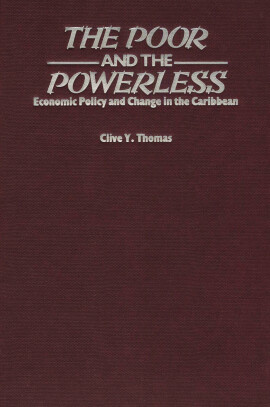
The Poor and the Powerless
Economic Policy and Change in the Caribbean
Foreign interests have dominated the economic development of the Caribbean since the first arrival of Europeans in the region five centuries ago. From the plantation system and slavery to the exploitation of oil and bauxite by the multinational
corporations, the history of the Caribbeau people is one of dependency and impoverishment. For the great majority, past and present- slaves, indentured laborers, p easants and workers, the unemployed- the region's subjection to extemal control has meant systematic hardship and social injustice. in this survey of economic development in the Caribbean, Clive Thomas traces the history of colonialism and neocolonialism from the perspective of this majority. Drawing lessons from numerous historical cases, Thomas argues that another form of development- by the poor and for the poor- is not only possible but necessary. The Poor and the Powerless offers a radical appraisal of the Caribbean's past vulnerability to foreign control and its future prospects for genuine independence.
Series: Latin America Bureau Books
Published: 1990
Pages: 412
Hardback: 9780906156346
corporations, the history of the Caribbeau people is one of dependency and impoverishment. For the great majority, past and present- slaves, indentured laborers, p easants and workers, the unemployed- the region's subjection to extemal control has meant systematic hardship and social injustice. in this survey of economic development in the Caribbean, Clive Thomas traces the history of colonialism and neocolonialism from the perspective of this majority. Drawing lessons from numerous historical cases, Thomas argues that another form of development- by the poor and for the poor- is not only possible but necessary. The Poor and the Powerless offers a radical appraisal of the Caribbean's past vulnerability to foreign control and its future prospects for genuine independence.
| Prelims - The Poor and the Powerless (Title Page, Copyright Information, Contents, Map, Preface, Introduction) | |||
|---|---|---|---|
| PART ONE: ROOTS | |||
| 1. Conquest, Settlement and Slavery: The Makings of the Colonial Economy | |||
| 2. Transition: From Colonial Slave Economy to Centre-Periphery Relations | |||
| 3. Revolt and War: The Caribbean Around the Time of the Second World War | |||
| PART TWO: INDEPENDENCE AND THE NATIONALIST ALTERNATIVES | |||
| 4. Colonialism and Nationalism: Alternative Economic Strategies | |||
| 5. Puerto Rico to the Rescue: Industrialisation by Invitation | |||
| 6. The Caribbean in Boom: Oil and Bauxite | |||
| 7. Foreign Plantations, Peasants and the State: The Struggle for Land | |||
| 8. The Search for New Poles of Growth: Tourism and Off-shore Banking | |||
| 9. The State and Institutional Reform | |||
| PART THREE: CRISIS AND THE NATIONALIST MODELS AND SOCIAL EXPERIMENTATION | |||
| 10. Social Structure, Ownership and Controls: The Basic Issues | |||
| 11. National Experiments: The Radical Options | |||
| 12. National Experiments: The Conservative Options | |||
| 13. Small Countries in a Big World: Metropolitan Versus Caribbean Integration | |||
| 14. Crisis, Reaction, Response: The Caribbean in the Late 1980s | |||
| 15. Conclusion: Another Development | |||
| Back Matter - The Poor and the Powerless (Notes, List of Acronyms, Bibliography, Index) |
Clive Thomas
Clive Thomas, a Guyanese economist, has been Director of the institute of Development Studies at the University of Guyana.





